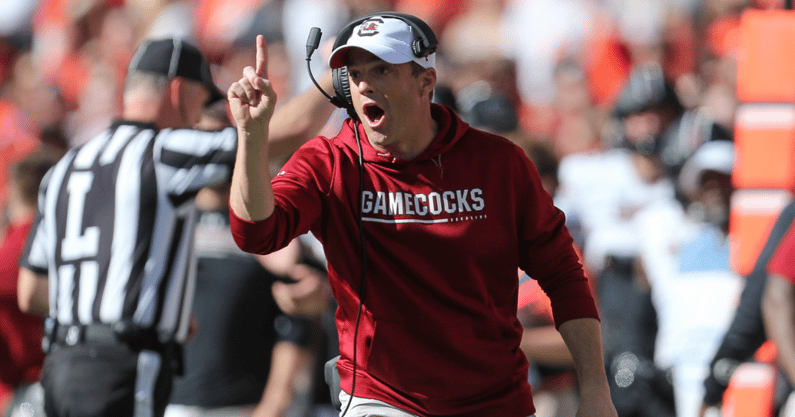Shane Beamer discusses how NCAA should enforce tampering rules in transfer portal

As the NCAA transfer portal has become a more inescapable reality in college athletics, coaches have had to adjust to a variety of different factors, including tampering rules that are difficult to enforce given the current NIL and transfer landscape.
It has left many of them frustrated, particularly because the answer as to what can be done when tampering is suspected isn’t very clear. Enforcement is hit or miss.
“Certainly can be better,” South Carolina coach Shane Beamer said. “But I also think it’s, there needs to be tangible evidence from a tampering standpoint.
“I think we all know it’s going on in a lot of ways, but having tangible evidence and proof and things like that is sometimes maybe harder to come by. But I think the enforcement staff, if you have something tangible you can give them that, ‘Here’s exactly what happened’ and pursue it, then I’m sure they’ll do a great job of pursuing it. But certainly it needs to be better.”
One of the tricky aspects to tampering rules is that there aren’t quite as rigid rules in the NCAA as, say, the NFL.
Players often know plenty of players on other teams from their days in high school football or on the camp circuit, which means they’re often in communication. Particularly when a player isn’t happy at the school he’s at, those lines of communication can open.
Where that turns into tampering with coaches potentially getting involved before players are officially in the NCAA transfer portal is, as Beamer pointed out, a bit hard to police.
Top 10
- 1
Memphis shakes up CFP
Tigers upsets changes CFP picture
- 2
A Twisted Mess
Big 12 Championship scenarios
- 3Trending
Saban chirped
Big 12 comes after GOAT
- 4Hot
Underranked SEC
Lane Kiffin protests CFP rankings
- 5
UConn star hospitalized
Alex Karaban hospitalized at Maui Invitational
There’s also the element to NIL that much of it is happening outside the school’s purview. Many NIL collectives are either not officially connected to the program or are loosely connected, such that college coaches don’t have oversight all the time if a collective is negotiating.
NIL isn’t supposed to be used as an inducement, of course, but that’s not always the reality.
So is there concern from coaches that they may report something about another program, all while they’re unsure what might be happening with third parties connected to their own program that might violate tampering rules?
“Yeah, maybe,” Beamer said.
But none of this is necessarily new to college football. It’s just the latest iteration of an age old theme. Programs are going to pursue players, boosters are going to get involved here and there and messy situations can be the end result. That’s why many coaches would like more clear tampering rules.
“I think that’s something that you can go back and whether it be transfer portal and tampering or any rules violation over the last 20, 30 years, what is it? Don’t throw stones in glass houses?” Beamer said.
“I think everybody looks at those situations and we all try and do things the right way. We know there’s violations for tampering and we as coaches, I mean we’re trying to do things, whether it be the recruiting calendar or whatever it might be, not to limit kids’ opportunities to transfer, but limit the opportunities for tampering to take place.”